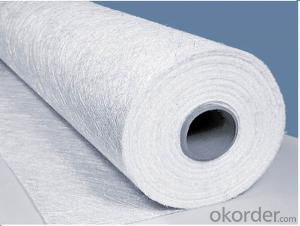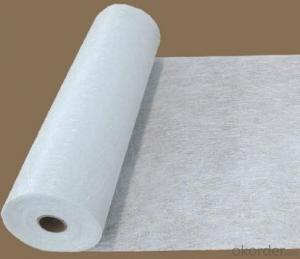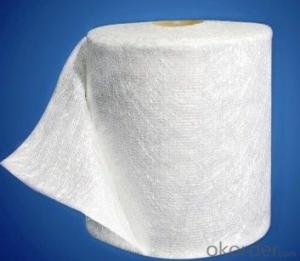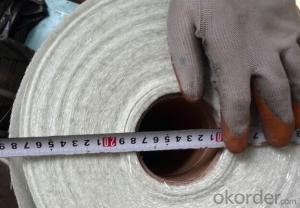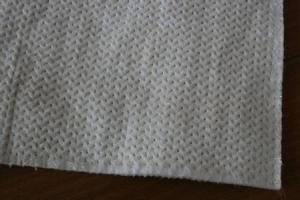Fiberglass Mat Tissue e-glass Chopped Strand Mat for FRP Pipe and FRP Panel
- Loading Port:
- Shanghai
- Payment Terms:
- TT or LC
- Min Order Qty:
- 20000 kg
- Supply Capability:
- 200000 kg/month
OKorder Service Pledge
OKorder Financial Service
You Might Also Like
1.Brief Introduction
E-Glass Emulsion Chopped Strand Mat is made of randomly distributed chopped strands held tighter by a emulsion binder. It is compatible with UP, VE, EP resins.
It is compatible with UP, VE, EP, PF resins.
The roll width ranges from 50mm to 3300mm.
Additional demands on wet-out and decomposition time may be available upon request.
It is designed for use in hand lay-up, filament winding, compression molding and continuous laminating processes. Its end-use applications include boats, bath equipment, automotive parts, chemical corrosion resistant pipes, tanks, cooling towers and building components
2.Product Features
Fast breakdown in styrene
High tensile strength, allowing for use in hand lay-up process to produce large-area parts
Good wet-through and fast wet-out in resins, rapid air lease
Superior acid corrosion resistance
3.Product Specifications
Property | Area Weight | Moisture Content | Size Content | Breakage Strength | Width |
(%) | (%) | (%) | (N) | (mm) | |
Mathods | IS03374 | ISO3344 | ISO1887 | ISO3342 | |
EMC80E | ±7.5 | ≤0.20 | 8-12 | ≥40 | 50-3300 |
EMC100E | ≥40 | ||||
EMC120E | ≥50 | ||||
EMC150E | 4-8 | ≥50 | |||
EMC180E | ≥60 | ||||
EMC200E | ≥60 | ||||
EMC225E | ≥60 | ||||
EMC300E | 3-4 | ≥90 | |||
EMC450E | ≥120 | ||||
EMC600E | ≥150 | ||||
EMC900E | ≥200 |
Special specification can be produce according to customer requirements.
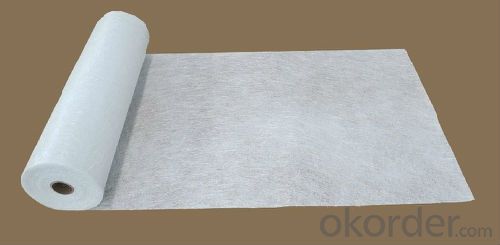
4.FAQ
Packaging:
Each Chopped Strand Mat is wound onto a paper tube which has an inside diameter of 76mm and the mat roll has a diameter of 275mm. The mat roll is wrapped up with plastic film,and then packed in a cardboard box or wrapped up with kraft paper. The rolls can be vertically or horizontally placed. For transportation, the rolls can be loaded into a cantainer directly or on pallets.
Storage:
Unless otherwise specified, Chopped Strand Mat should be stored in a dry, cool and rain-proof area. It is recommended that the room temperature and humidity should be always maintained at 15℃~35℃ and 35%~65% respectively.
- Q: Can fiberglass mat tissue be used for insulation in oil refineries?
- No, fiberglass mat tissue is not suitable for insulation in oil refineries. Fiberglass mat tissue is primarily used in construction and automotive industries for reinforcement purposes. It is not designed to withstand the extreme temperatures and corrosive environments found in oil refineries. Instead, insulation materials used in oil refineries are typically made of fire-resistant and chemically resistant materials, such as mineral wool or calcium silicate. These materials are specifically engineered to provide optimal thermal insulation and safety in refinery operations.
- Q: Is fiberglass mat tissue suitable for underground applications?
- Fiberglass mat tissue is perfect for use underground. This material is widely utilized in various industries like construction, infrastructure, and plumbing because of its exceptional strength, durability, and ability to resist environmental factors. Underground environments often present difficulties such as moisture, high humidity, and corrosive substances, which can compromise traditional materials. However, fiberglass mat tissue is specifically designed to endure these conditions, making it an excellent choice for underground applications. Moreover, its non-combustible nature and resistance to chemicals ensure it is a dependable option for areas where fire safety is a concern. In conclusion, fiberglass mat tissue is a versatile and reliable material that can effectively endure the challenges of underground environments.
- Q: Can fiberglass mat tissue be used for reinforcing fiberglass pools?
- Yes, fiberglass mat tissue can be used for reinforcing fiberglass pools. Fiberglass mat tissue is a thin, flexible material that is commonly used in the construction and repair of fiberglass structures, including pools. It is made up of fine glass fibers that are bonded together with a binder. When applied to the surface of a fiberglass pool, the mat tissue provides additional strength and reinforcement, helping to prevent cracks or damage. It is typically applied in conjunction with a fiberglass resin, which acts as an adhesive to bond the mat tissue to the pool surface. Using fiberglass mat tissue for reinforcing fiberglass pools is a common practice and can help to extend the lifespan and durability of the pool.
- Q: Can fiberglass mat tissue be used for insulating radiant floors?
- Yes, fiberglass mat tissue can be used for insulating radiant floors. It is an effective insulation material that helps to minimize heat loss and improve energy efficiency in radiant floor heating systems.
- Q: Does fiberglass mat tissue require any special treatment for UV resistance?
- Yes, fiberglass mat tissue does require special treatment for UV resistance. Without proper protection, the fiberglass mat tissue can degrade and weaken when exposed to sunlight and UV rays. Applying a UV-resistant coating or using a UV protective film can help enhance its durability and resistance to UV damage.
- Q: What is the tear strength of fiberglass mat tissue?
- The ability of fiberglass mat tissue to resist tears or cracks when exposed to external forces is referred to as its tear strength. This characteristic plays a crucial role in determining the durability and performance of fiberglass mat tissue in different applications. Standardized testing methods, such as the ASTM D1922 tear resistance test, are typically used to measure the tear strength of fiberglass mat tissue. This test involves applying a controlled force, usually in the form of a tensile load, to a sample of the material and measuring the amount of force required to cause a tear or rupture. The tear strength of fiberglass mat tissue can vary depending on factors such as the manufacturing process, the quality of the raw materials used, and the specific requirements of the application. Generally, fiberglass mat tissues are designed to have high tear strength in order to withstand the stresses and strains encountered during installation and use. Fiberglass mat tissue finds widespread use in industries like construction, automotive, aerospace, and marine, thanks to its high tear strength and other desirable properties. It is commonly employed as a reinforcement material in composites, providing increased strength and durability to the final product. In summary, the tear strength of fiberglass mat tissue is a vital property that determines its ability to resist tearing or cracking when subjected to applied forces. By ensuring a high tear strength, fiberglass mat tissue can meet the demands of various applications and deliver long-lasting performance.
- Q: Does fiberglass mat tissue provide good thermal conductivity?
- No, fiberglass mat tissue does not provide good thermal conductivity. Fiberglass is known for its insulating properties, meaning it is a poor conductor of heat. It has a low thermal conductivity, which means it does not effectively transfer heat. This makes fiberglass mat tissue a suitable material for insulating applications where heat transfer needs to be minimized, such as in building insulation or in the manufacturing of heat-resistant clothing.
- Q: What is the expected lifespan of fiberglass mat tissue in outdoor applications?
- The expected lifespan of fiberglass mat tissue in outdoor applications can vary depending on several factors such as exposure to weather conditions, maintenance, and quality of the material. However, on average, fiberglass mat tissue can last for approximately 20 to 30 years when properly installed and maintained.
- Q: How does fiberglass mat tissue perform in terms of moisture vapor resistance?
- Fiberglass mat tissue performs well in terms of moisture vapor resistance. It is highly resistant to moisture vapor, preventing its penetration and protecting the underlying materials. The tightly woven fibers of the tissue create a barrier that limits the transfer of moisture, making it an effective choice for applications where moisture control is crucial.
- Q: Is fiberglass mat tissue resistant to UV radiation?
- No, fiberglass mat tissue is not resistant to UV radiation.
Send your message to us
Fiberglass Mat Tissue e-glass Chopped Strand Mat for FRP Pipe and FRP Panel
- Loading Port:
- Shanghai
- Payment Terms:
- TT or LC
- Min Order Qty:
- 20000 kg
- Supply Capability:
- 200000 kg/month
OKorder Service Pledge
OKorder Financial Service
Similar products
Hot products
Hot Searches
Related keywords
